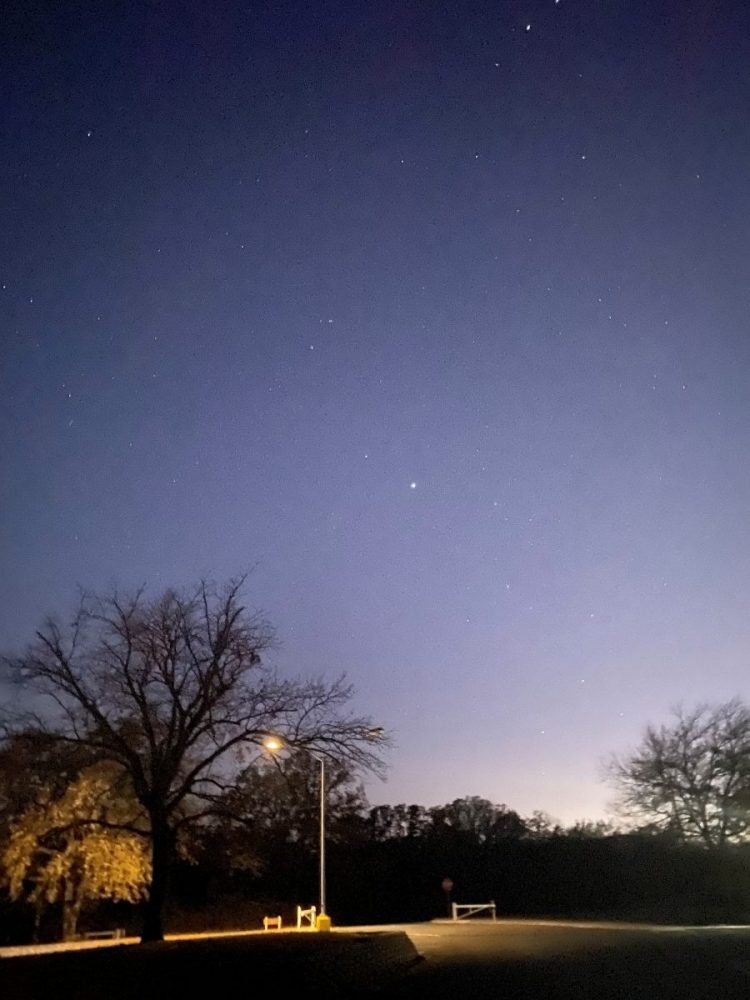Star Gazing and Dark Skies at Cooper Lake State Park!
Experience Dark Skies and the Cosmos at Cooper Lake State Park!

Cooper, TX— When was the last time you stopped to gaze into the heavens at night? For most Americans, the once common activity is now no more than a distant cultural memory, or maybe an unsatisfying upward glance towards a fussy glow with maybe a dozen stars and planets visible: Not an awe-inspiring experience. Rewind a hundred years and in most locations on the continent you could see untold thousands of stars with the dense band of the Milky Way visible. In the past, humans, had an unimpeded view and connection to the night skies; our constant companion since the beginning of our species. We are intertwined with the stars in so many ways most of us don’t truly understand. Our distant lineages have told and passed down constellation stories, creating cultural connections for thousands of years. Today, less than 20% of Americans have access to seeing the Milky Way on a moonless night. Once something as common to our collective heritage is taken away (slowly and subtly) we are all poorer in spirit and have less of a connection to our natural world. But wait, all is not lost! We still have locations scattered throughout the U.S. that have a window into the cosmos and to our shared past that we can experience. And you guessed it! Cooper Lake State Park is one of those special places.
Cooper Lake State Park is still a great place to view the heavens. Situated less than 100 miles from Dallas – Fort Worth and several smaller cities which makes our impressive, special dark skies easily accessible! All night skies can be rated based on impact from artificial interfering light. This system is based on the Bortle scale which classifies night skies from grade of 1 which is the darkest of the dark. These are prehistory dark skies – what our kind would have seen 10,000 years ago around a campfire. Texas State Parks has one of those incredibly rare locations – Big Bend Ranch State Park. Cooper Lake State Park is a 3 on the scale. Cities throughout the US are usually an 8-9 grade with about a dozen visible stars.
The biggest threat to the night sky is thoughtless use of outdoor lighting. Not all outdoor lighting is created equal. Outdoor lighting is critical for safety. The key to providing lighting for human safety without impacting the quality of our night skies is relatively simple, and Cooper Lake State Park has implemented these measures and can be a blueprint for others to follow. By no means did the park develop these measures alone, but through information provided by the International Dark Sky Association. Here are several key points to incorporate for new outdoor lighting or for the conversion of existing lights:
- Use only shielded full cutoff fixtures. These reduce glare which is a vision-killer and also focuses light to where it is actually needed.
- Use only the amount of light that is minimally required for your needs. Reduce wattages and numbers of fixtures. (Saving money on electricity as a biproduct)
- Use only warm lighting which is defined as 3000o Kelvin or less. These lights are more yellow in color.
- Utilize motion sensors where applicable. Provide light only when needed.
At Cooper Lake State Park, we have replaced our parking lot lights with warm 3000o Kelvin LED bulbs. In addition, we modified these fixtures to focus light and eliminate glare. Also, we reduced the number of lighted fixtures by 70% providing minimal but adequate illumination for safety. We replaced all sidewalk shielded fixtures with 1700o Kelvin yellow bulbs. We replaced all exterior building lights with warm 1700o to 2500o Kelvin yellowish bulbs.
December is going to be the best month of the year for star gazing! As the nighttime temperature drops, so does the humidity in the air. Drier air makes for clearer star gazing. The centerpiece event for the month and for 2020 is the Geminids Meteor Shower that runs from December 11th– peaking overnight on December 13th and 14th. Colorful long meteor tails are predicted. To make the viewing the best it can be is that the celestial event occurs during the new moon phase which means no moon to wash away the darkness. All star gazers and meteor hunters are welcome to stay overnight in our day – use areas to view this phenomenon. An additional activity fee is required per person for those staying after 10 pm nightly. This is important because the very best viewing usually occurs after midnight.
Cooper Lake State Park entrance fees are $5 for adults; kids 12 and under always free (additional $2 activity fee for day-users staying after 10pm to fish or star gaze). Senior Texans 65 or older will only pay $3 to enter the park daily with a Bluebonnet Pass. Unlimited park entrances for you and everyone in your vehicle can be accomplished with the purchase of a Texas State Park Annual Pass for $70, which is good for over 12 months (Annual Pass does not cover overnight activity fees). Buy your pass and let your Texas adventure begin!
For more information on the park, please visit and like our Facebook pages (Cooper Lake State Park – South Sulphur (903)-945-5256 and Cooper Lake State Park – Doctors Creek (903) 395-3100).






